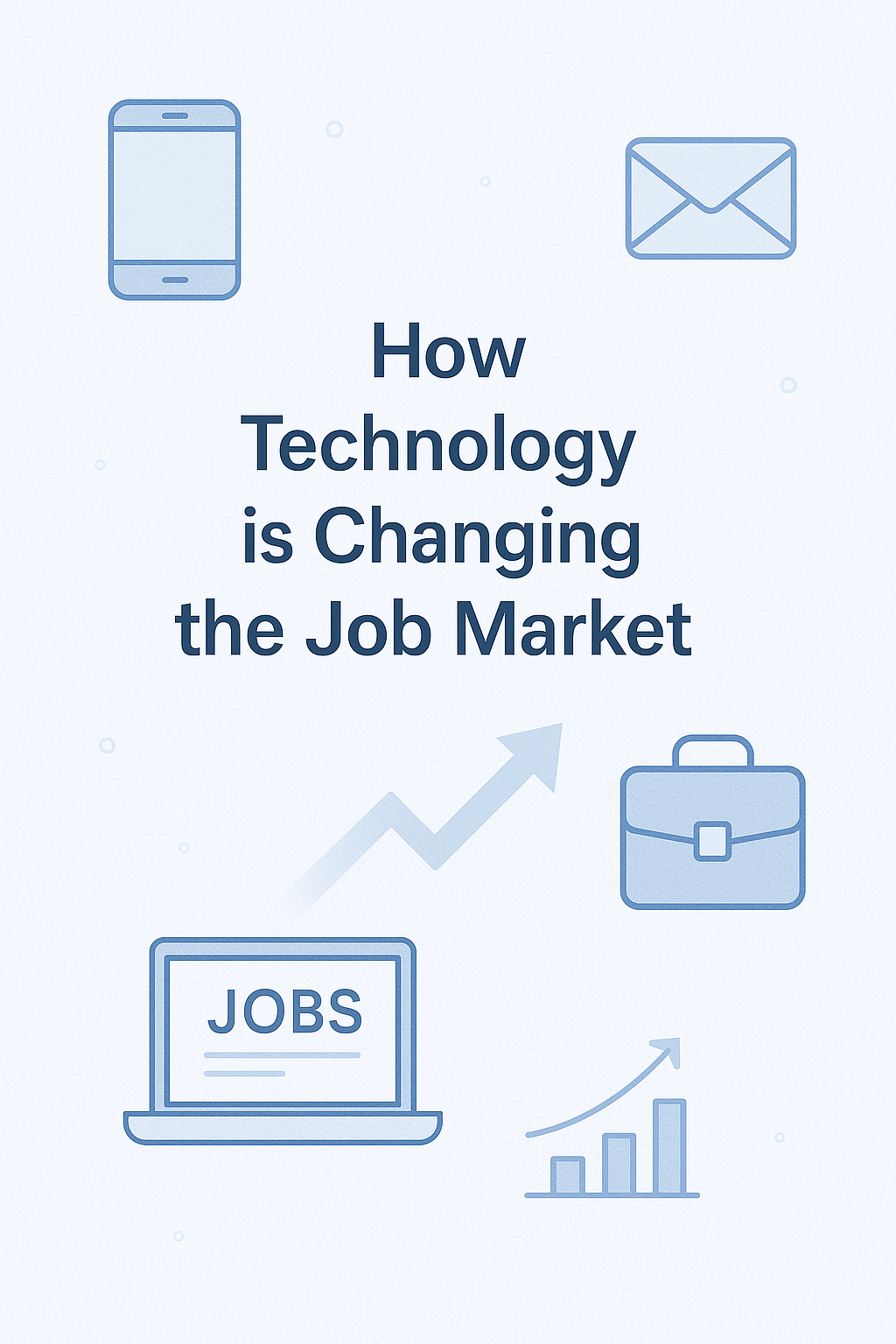The job market in 2025 is undergoing a rapid transformation, driven largely by the accelerated adoption of technology. From AI and automation to remote collaboration tools and digital platforms, technology is reshaping the way people work, how companies hire, and what skills are in demand. Understanding these shifts is crucial for job seekers, employers, and educators alike.
1. The Rise of AI and Automation
Artificial Intelligence and machine learning continue to redefine roles across industries. Repetitive, rule-based tasks are increasingly handled by algorithms, freeing up human talent for creative and strategic functions.
Key Impacts:
- Automation of administrative and data-entry roles
- AI-powered chatbots for customer service
- Predictive analytics in HR and recruitment
- Growth in AI-related roles: ML engineers, data scientists, prompt engineers
Insight: Workers must reskill for tasks that require human judgment, empathy, and innovation.
2. Remote Work and the Digital Workspace
Technology has made remote work not just possible but productive. Cloud-based tools, video conferencing, and asynchronous collaboration platforms are now standard.
Effects on the Job Market:
- Companies tap global talent pools
- Increased competition for remote jobs
- Higher value placed on communication and time management skills
Popular Tools: Zoom, Microsoft Teams, Slack, Notion, Asana
Job Market Trend: Rise in fully remote and hybrid job postings across tech, marketing, customer support, and design.
3. Tech-Driven Job Creation
While some jobs are being automated, many new roles are emerging due to technological advancements.
Fast-Growing Tech Jobs in 2025:
- Cybersecurity Analyst
- Cloud Architect
- AI Ethicist
- Blockchain Developer
- Robotics Technician
- Augmented Reality (AR) Designer
Pro Tip: Platforms like LinkedIn Learning, Coursera, and edX offer micro-credentials and nano-degrees for these roles.
4. Digital Recruitment and AI Screening
The hiring process has become more tech-dependent than ever. Recruiters use AI to filter resumes, analyze candidate video interviews, and predict job fit.
Technologies in Use:
- ATS (Applicant Tracking Systems)
- AI-powered screening tools (e.g., HireVue, Pymetrics)
- Behavioral and personality analysis via AI
Tip for Job Seekers: Use keywords from job descriptions in your resume and practice for video interviews using platforms like Interviewing.io.
5. Demand for Digital Literacy and Soft Skills
Employers expect all employees to have a baseline level of digital fluency, regardless of role. Soft skills like adaptability, collaboration, and critical thinking are more important than ever.
In-Demand Digital Skills:
- Data literacy
- Spreadsheet modeling (Excel, Google Sheets)
- Cyber hygiene and basic IT troubleshooting
- Project management tools (e.g., Trello, Monday.com)
Top Soft Skills in 2025:
- Emotional Intelligence (EQ)
- Cross-cultural communication
- Change management
- Creativity and innovation
6. The Gig Economy and Freelancing Platforms
Technology has enabled a booming gig economy. Professionals now market their skills directly to clients through online platforms.
Popular Platforms:
- Upwork
- Fiverr
- Toptal
- Freelancer.com
Trend: High-skill freelancing (e.g., software development, consulting, design) is becoming mainstream, with more workers choosing flexibility over full-time roles.
7. Blockchain, Web3, and Decentralized Work Models
Blockchain and Web3 technologies are promoting transparency, security, and decentralization in work structures.
Applications in the Job Market:
- Smart contracts for freelancers
- Blockchain-based resumes and credentials (e.g., Learning Economy Foundation)
- DAOs (Decentralized Autonomous Organizations) offering new employment models
Emerging Roles: Crypto compliance analysts, NFT strategists, DAO community managers
8. Lifelong Learning and Continuous Upskilling
With the rapid pace of technological change, lifelong learning has become a necessity. Certifications, bootcamps, and self-paced courses are the new norm.
Popular Learning Channels:
- edX (from Harvard/MIT)
- Coursera (with Google, IBM, Meta certifications)
- Udemy
- LinkedIn Learning
Pro Tip: Keep your LinkedIn profile updated with every certification—many recruiters now use filters to find candidates by specific skillsets.
9. Virtual Reality (VR) and Augmented Reality (AR) in Workplaces
Immersive technologies are revolutionizing employee training, product design, and remote collaboration.
Examples:
- VR simulations for healthcare training
- AR in manufacturing and logistics
- Virtual coworking spaces
Job Growth: VR developers, immersive experience designers, and XR content creators
10. Environmental Tech and the Green Job Surge
Sustainability is a key trend shaping the job market. Technology plays a vital role in addressing climate change and promoting green innovation.
Tech-Powered Green Careers:
- Solar energy engineers
- Environmental data analysts
- Climate tech product managers
Hot Platforms: Climatebase, Terra.do, GreenBiz Job Board
Adapting to a Tech-Driven Future
Technology in 2025 is not eliminating work—it’s evolving it. Success in this new era means staying agile, continuously learning, and embracing change. As automation reshapes industries, the most valuable professionals will be those who blend technical proficiency with creativity, empathy, and adaptability.
